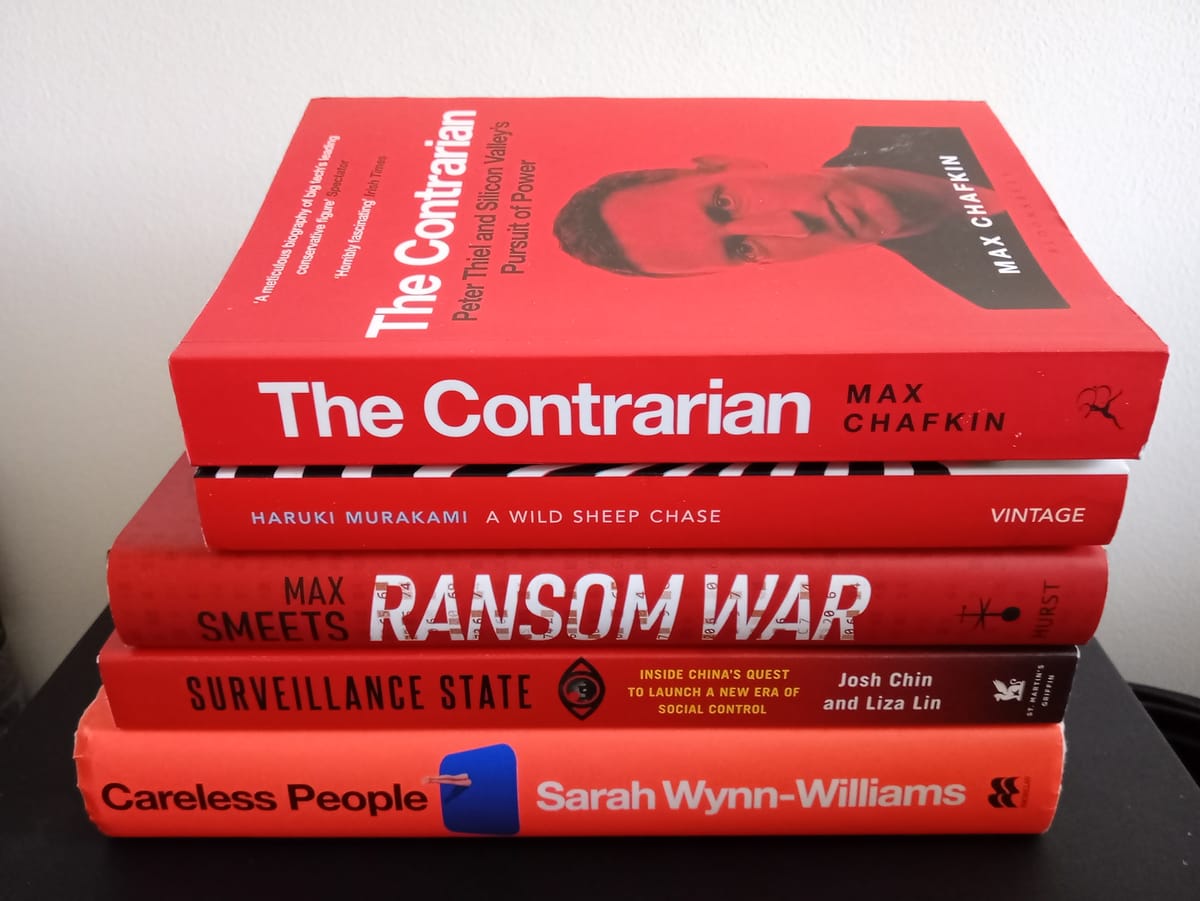The Digital Underbelly: Where Cyber Wars, Oligarchs, and Phantom Sheep Collide

Buckle up and pour something strong—because the world we’re living in isn't the tech utopia we were promised. Forget the glossy speeches of Silicon Valley founders and their libertarian dreams of "disruption." What we're seeing unfold is a digital arms race: billionaires consolidating power, corporations turning apathy into policy, governments weaponizing data, and hackers holding cities hostage. And somewhere in all this chaos? A sheep. We’ll get there.
Let’s begin with one of the digital age’s most quietly dangerous architects:
Peter Thiel: Building the Future, Dismantling Democracy
Peter Thiel isn’t just a venture capitalist—he’s a power broker with a long game. As Max Chafkin chronicles in The Contrarian, Thiel has turned a philosophical disdain for democracy into real-world influence that now spans elections, surveillance infrastructure, and national security.
Raised partly in apartheid-era South Africa, Thiel emerged with a deep suspicion of mass rule and a firm belief in elite governance. He’s not subtle about it either. Thiel has openly questioned whether democracy and capitalism can coexist, and through companies like Palantir—a darling of intelligence agencies—he’s positioned himself as a crucial node in the surveillance-industrial complex.
This isn’t just about tech startups anymore. Thiel has bankrolled political candidates with authoritarian leanings and funneled dark money into campaigns aimed at dismantling regulatory structures. His actions suggest a future in which data is controlled by a few, elections are shaped by billionaires, and surveillance isn't just a government tool—it’s a private asset.
Let’s be clear: Thiel is not some misunderstood genius or philosophical provocateur. He is actively shaping a reality where democracy is optional and control is absolute.
Facebook’s Empire: “Careless” Is Putting It Mildly
Next, we move to Careless People by Sarah Wynn-Williams, a former Facebook insider turned whistleblower. The title understates the truth. This is not a story of mere negligence—it’s a blueprint for how indifference at scale becomes structural harm.
Facebook, now Meta, has facilitated everything from genocide in Myanmar to rampant misinformation during democratic elections—and did so while chasing growth metrics. Wynn-Williams exposes a culture where ethical concerns were consistently steamrolled by quarterly earnings reports, and where misogyny and moral disengagement were simply business as usual.
Mark Zuckerberg, with his carefully curated “everyman in a hoodie” persona, may appear less sinister than Thiel, but his influence is arguably more insidious. His product touches billions of lives daily, and yet it's driven by an algorithmic system designed to amplify outrage, division, and lies. And let’s not forget: Facebook is also where authoritarian regimes have quietly built propaganda networks and gathered intelligence, often with little resistance from the company itself.
This isn’t just carelessness. It’s complicity. And when a handful of people can shape the emotional and political lives of the planet, it’s not a social network—it’s a control system.
Ransomware: Organized Crime for the Digital Age
While the titans of tech reshape the landscape, they’ve also laid the groundwork for new digital predators to thrive. Max Smeets’ Ransom War is a clinical, often chilling breakdown of the new face of warfare—one waged not with tanks or missiles, but with malicious code.
Forget the stereotype of the lone hacker in a hoodie. Modern ransomware operations are structured, well-funded, often state-tolerated enterprises. They hold entire governments, utilities, and hospitals hostage—and worse, they’re remarkably effective.
Smeets reveals the terrifying efficiency of this industry. Victims are profiled, infiltrated, and extorted with ruthless precision. Payment is just a part of the business model. Reputation management, negotiation services, even “customer support” for decryption—these are now common features.
And yet, much of the infrastructure exploited by ransomware gangs was created by the very companies we trust: lax security, vast centralized databases, and a blind rush toward digitization without resilience. The system wasn’t built for safety. It was built for profit. And now, we’re all paying the ransom.
China’s Surveillance State: A Mirror We Refuse to Look Into
Then there’s Surveillance State by Josh Chin and Liza Lin—a meticulously reported descent into China’s hyper-digitized, AI-powered authoritarianism.
This isn’t science fiction. In China, surveillance is not a tool of last resort—it’s the infrastructure of everyday life. Facial recognition, predictive policing, biometric tracking, and social credit scoring form a comprehensive apparatus of control. And nowhere is this more extreme than in Xinjiang, where digital surveillance underpins a system of mass repression.
Chin and Lin show us what happens when the tools of Silicon Valley are adopted without the constraints of democracy. But here’s the uncomfortable truth: many of the technologies China deploys were developed—or inspired—by Western companies. And in the U.S., similar tools are already creeping into public life under the banner of “smart cities” and “predictive analytics.”
China may be the most advanced model of digital authoritarianism, but it’s not unique. It’s a warning—and one we’re not taking seriously enough.
A Sheep Walks into a Surveillance State…
So where does Haruki Murakami’s A Wild Sheep Chase fit in?
It seems out of place—a surreal novel about a disillusioned ad executive chasing a possibly imaginary sheep. But here, the sheep becomes a metaphor. It represents the intangible thing we’re all still grasping for: agency, authenticity, control. In a world saturated by manipulation and observation, it’s the elusive sense that we are more than data, more than products, more than pawns.
Murakami’s protagonist, drifting through absurdity in search of meaning, mirrors our own collective condition: trapped in systems too large to understand, too powerful to escape, and too embedded to resist easily. We chase the illusion of choice while everything from our emotions to our voting patterns are quietly steered by algorithms.
Conclusion: Who’s Really in Control?
The digital world was sold to us as a revolution in freedom. What we got instead was a high-speed descent into corporate feudalism and techno-authoritarianism.
Peter Thiel and Mark Zuckerberg aren’t simply tech founders. They are architects of a future where power is privatized, transparency is optional, and surveillance is normalized. Their platforms aren’t just neutral tools—they’re mechanisms of influence that both empower and undermine entire societies. The ransomware networks exploit these systems. Authoritarian regimes mimic them. And we—users, citizens, consumers—are left exposed, distracted, and divided.
The real question isn’t if we're being watched or manipulated. It’s how much, by whom, and why we’re so willing to accept it.
So ask yourself:
Are you in control of your digital life, or are you chasing a sheep through a maze someone else designed?
Stay skeptical. Stay human. Maybe log off now and then. And yes—grow those vegetables.




